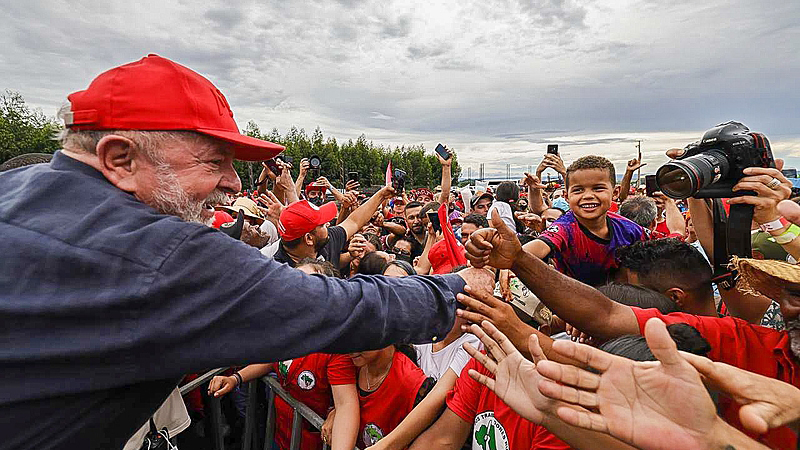Agrarian reform and agro-ecology were among the issues discussed during Lula’s visit on Saturday, March 19 to the Eli Vive settlement, of the Landless Rural Workers Movement (MST). The settlement is located in Londrina, in the state of Paraná, and is Brazil’s largest agrarian reform area in a metropolitan region. The visit was part of the the event “Solidarity Day: Towards the Peoples Committees” and rallied around 10,000 people.
In his speech, presidential pre-candidate Luiz Inácio Lula da Silva (PT) remarked that one of his priorities is to fight hunger in the country, encourage family-based agriculture, and regain national sovereignty.
“Hunger is one of the most barbaric things that society has allowed. This world does not need to be as unequal as it is. Family-based agriculture has the capacity to feed our country. We need to recover Brazilian sovereignty. A sovereign country cares for education, forests, waters, food, and people.”
Lula also evaluated the current makeup of the National Congress and spoke about the importance of electing candidates for the House, Senate, and state governments who are committed to the popular struggle.
“The Brazilian National Congress has never been so malformed and so anti-people as it is now. It has never been so deferential to anti-national interests as it is now. This is perhaps the Congress that is the most against Brazil. It is important to remember that it is not enough to elect Lula as president, if we don’t change the quality of the elected representatives and senators,” he affirmed.
Also present at the meeting were the president of the PT and the federal deputy of Paraná, Gleisi Hoffmann, former senator Roberto Requião, the national leaders of the MST João Pedro Stedile and João Paulo Rodrigues, and the chef Bela Gil, who gave one of the first speeches at the meeting and defended a popular agrarian reform.
“All Brazilians need to have the opportunity to choose the food they want to put on their plates. Popular agrarian reform and family-based agriculture are essential to democratizing access to land. This way, people will have healthy food on their plates,” she said.
Gleisi Hoffmann highlighted the actions of the MST, especially during the pandemic, and laid out the path that Lula’s campaign will follow in the electoral process.
“If there is one feature of the MST it is solidarity. In all the struggles of the people, the MST is present. Today Lula is free, innocent, ready to be president and we have to prepare for this journey. The Brazilian people are placing their hope in us. We have been discussing the way that we have to organize ourselves here in Paraná, but also in Brazil.”
Roberto Requião, the pre-candidate to the governorship of Paraná, emphasized the importance of movements that defend agrarian reform in building public policies for the country.
“Despite my indignation, I find hope in you all [MST]. We need a government that walks alongside the people. We will win this battle, which is a battle for identity. The identity of the people.”
Agroecology and the struggle for land were points highlighted in a speech by João Pedro Stédile, who stated that it is only “through popular unity that the people will be able to advance.”
“The true goal of agrarian reform is to produce healthy food for everyone. We need a big national agroecology program to build agrarian reform. The popular committees are the people telling Lula what they want to change in Brazil.”
Committees for Popular Struggle
During the visit, the Workers’ Party launched a project that intends to create, by April, 5,000 popular struggle committees throughout the country.
The idea is to strengthen the PT’s grassroots work through a network that involves social movements and the population. The strategy is part of the party’s two main objectives for 2022: the reduction of backwards policies promoted by the government of Jair Bolsonaro (PSL), and the election of Lula in the election in October.
This article was written by Nayá Tawane and originally published in Brasil de Fato.





